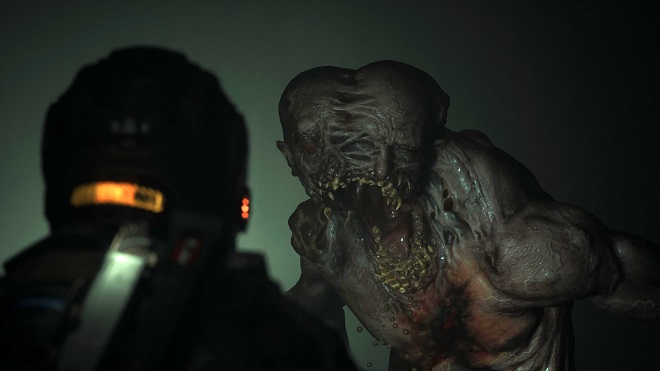Quarantine Control #115: No Time to Fry — The Game

COVID-19 cases are starting — starting! — to drop again in multiple states. But this was the week where a bunch of people around the world realized that this virus will be around for a good while to come, if not forever, if they hadn’t already. There’s no telling how long the virus will mutate and how many new variants will be created as a result, and the fact that a bunch of experts aren’t certain of how long it will swirl around is a horrendous sign for the future. It’s also a predictable twist considering how badly humanity managed the pandemic since shortly after the start of it.
Geoffrey Barnes
Another week, another movie.
No Time to Die (2021)
Source: Amazon Prime Video
Episodes: 1 movie (the last Bond film from Daniel Craig)
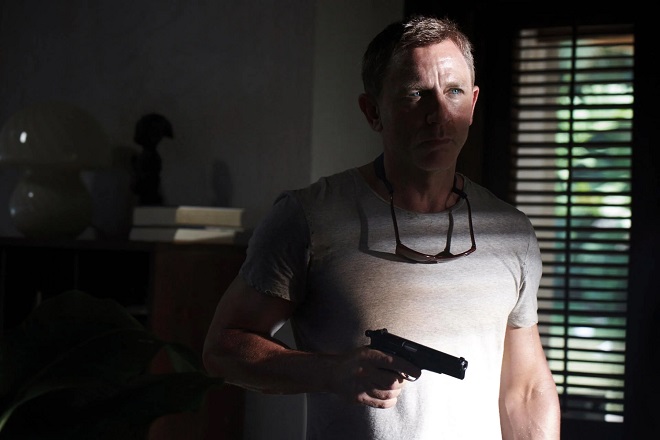
Casino Royale was one of the best things to happen to the James Bond franchise in a long time when it released in 2006, and clearly benefitted actor Daniel Craig and others involved with the film. It was also one of the worst things to happen to the franchise.
The challenge that came afterward came with making installments on par with the movie that kicked off this current series of Bond films, if not topping it, which proved as daunting a task as it sounded. Quantum of Solace wasn’t quite as good despite continuing the story from the prior film thanks to the writing letting the characters down, but I was more forgiving on it than others thanks to it still providing entertainment, the solid ending, and the brisk pacing. Skyfall, which largely stood alone, was great, though still not on par with the first Craig Bond film. Spectre (which I discussed here), however, was the biggest letdown of all, with underutilized characters and plot threads (including a massive nefarious organization teased in the background of several films) alongside pitiful pacing. You might come to a conclusion from the trend lines here: The odd-numbered installments are the better ones, therefore No Time to Die, the fifth and final movie in this series, must be pretty great. Guess what? Outside a few issues that hold it back, that’s largely right.
No Time to Die finishes a story established in Spectre, with Bond trying his best to enjoy a largely normal life with Madeleine Swann (Léa Seydoux) in Matera, retiring the 007 codename from MI6. That’s “largely” because Bond continues to look over his shoulder, anticipating that his and Swann’s enemies will return to strike at any point. This is an action movie that received plenty of trailers over the years, with a theatrical release that was continually delayed thanks to COVID-19, so it’s no surprise when he’s proven right. Bond then seeks to find out who’s responsible for this after being convinced to come out of retirement from old friend and returning character Felix Leiter (Jeffrey Wright), and simultaneously starts doubting whether Swann herself was telling him the truth.
No Time to Die is the longest Bond ever released at 163 minutes, an intimidating number by itself. But it’s especially daunting when it’s coming after a movie only slightly shorter than this one but felt much longer thanks to pitiful pacing. Fortunately, this one justifies it with a more complex storyline fitting for Craig’s final Bond film. It’s also enough to provide development for the sheer number of characters involved played by good actors. In addition to other returning characters like M (Ralph Fiennes), Q (Ben Whishaw), and Moneypenny (Naomie Harris), there are new characters to develop like current 007 agent Nomi (Lashana Lynch) and villain Safin (Rami Malek). The movie gives… enough, development to all of them, though some fared better than others.

But I especially have to single out Ana de Armas as Paloma, who makes a hell of an impression despite only appearing for about ten minutes in the movie’s first half. She has minimal impact on the plot, and it’s clear her scenes were filmed late in its production. But she was a lot of fun, to the point that I’m surprised a spinoff starring her hasn’t been green lit yet. Don’t tell me Eon Productions wasted too much time deciding whether to go for it or not and lost her to a John Wick spinoff, a movie that, to be fair, could be a fun one in itself.
There are two key issues that hold the film back from greatness. The relationship between Bond and Swann isn’t as convincing as it should be thanks to the lack of necessary charisma between Craig and Seydoux, and the 18-year age gap between the two isn’t entirely responsible for it. It doesn’t come close to replicating the charisma between Bond (Craig) and Vesper Lynd (Eva Green) from Casino Royale, who themselves had a 13-year age gap. Safin is also not as intimidating of a villain as he should be despite Malek’s acting talents, and the blows he lands on Bond throughout the story feel unearned as a result.
It’s a pity the movie’s conclusion didn’t have more of an “epic” feel for Craig’s final outing in the most serious and grounded Bond series yet. But it’s nonetheless a solid film that marks a fitting-enough ending for this series. The conclusion leaves me, and perhaps any Bond movie fan, wondering where in the world the series can go from here with whoever they choose to be the next actor donning the name, though I know that sometimes even the world is not enough.
Angela Moseley
At work I’ve recently begun to take a full hour lunch break instead of 45 minutes. Those extra 15 minutes have been extremely helpful in being able to catch up on streaming shows. I’ve also noticed that services like Amazon Prime and Netflix seem to outclass dedicated anime streaming services such as Crunchyroll and HiDive. I can watch stuff on Amazon or Netflix without endless video buffering. Funimation was the sole exception, but that brand and service is going the way of the dodo.
Anyway, once I’m caught up on my QC backlog, I’m looking forward to writing about the streaming shows I’m currently catching up on. For now, have another podcast recommendation.
Dead End: A New Jersey Political Murder Mystery (2022)
Source: WNYC Studios
Episodes: 8
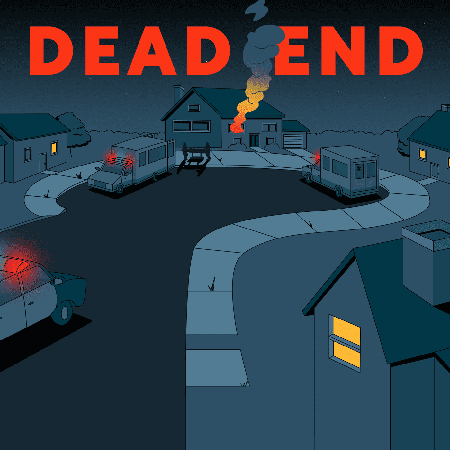
On last week’s QC, you may have remembered that I mentioned the primary way I find new podcasts is by listening to other podcasts. Today’s recommendation is a classic example. The first episode of Dead End: A New Jersey Political Murder Mystery was aired by On the Media and I was intrigued. (This is also how I found Blindspot the Road to 9/11 for QC #37.) True crime shows aren’t a regular part of my listening experience, but I enjoyed productions like the first season of Serial. Plus, Dead End is a podcast that hits close to home taking place across the Delaware River in the state of New Jersey. Politics in New Jersey are unique and I can’t say I wasn’t surprised by the prospect of a murder mystery.
John and Joyce Sheridan were a wealthy couple living in North Jersey. John was a Republican lobbyist who worked with numerous administrations over the decades. Joyce was a public school teacher. On the early morning of September 28, 2014, a neighbor made a call to authorities about a fire at the Sheridan’s home. When fire fighters arrived, they discovered that a grisly murder had taken place in the couple’s bedroom. John was found dead under an armoire, fatally stabbed and partially burned. Meanwhile, Joyce was found stabbed to death on the bed.
In putting out the fire and removing the couple’s bodies, the crime scene had been contaminated. Detectives arriving on the scene quickly ruled the case as a murder-suicide, with John taking his spouse’s life, setting the room on fire, then taking his own life. The Sheridans had four adult sons and none of them believed their mild-mannered father would actually murder their mother. Additionally, none of the Sheridan’s friends had seen any signs of stress or trouble in their long marriage. One of the couple’s sons, Mark Sheridan, a lawyer for the Christ Christie campaign at the time conducted his own investigation, including hiring a private medical examiner. Multiple discrepancies from both the private autopsy and another investigation of the crime scene were discovered.
Clues were found, suggesting that the couple may have been murdered by a third party. This includes never finding the knife that ended John’s life, which was different from the recovered knife that ended Joyce’s life. Blood on the walls outside of the bedroom and on the front door. A neighbor who had remembered seeing an unknown car in the area on the morning of the murders. More importantly, a similar murder of a political lobbyist had taken place months before the Sheridans died. These revelations lead Mark on a quest to have the case reopened by the New Jersey Attorney General and to clear his father’s name.
Dead End takes listeners on on Mark’s journey to have his father’s name cleared, despite road blocks from local and state investigators. It also shows how sloppy the original investigation was and implies John and Joyce may have been murdered for political reasons. The investigation is both fascinating and frustrating. Businessman and power broker Gorge Norcross and his Camden river front deal in South Jersey are explored. (Norcross is in no way implicated in the Sheridans’ murder.) Like most recent true crime stories, there is no satisfying end and the case is ongoing, having been recently reopened. Still, it is not a good look for the justice system overall in New Jersey– if it can fail a powerful and well-connected family, how does it let down average residents?
If true crime stories are interesting to you, Dead End may be worth a listen.
Joseph Daniels
It’s probably not going to come as a surprise to you but I love game shows. They’re one of my favourite genres of television to watch.
Actually, I should probably clarify that I like quiz shows. Games that aren’t quizzes can be hit and miss for me. It depends on if the show is too gimmicky.
Although come to think of it, quiz shows can be terrible too. If you don’t know what you’re doing, your show is likely going to suck. I remember when The Nostalgia Critic created a quiz show called Pop Quiz Hotshot. It ran for twelve episodes and was not good. I think he was trying for a hybrid between a comedy show and a quiz show, and one of the scoring methods involved if he liked your answer. If I recall, in one episode, a player had several points and had yet to answer anything correctly. I say “if I recall” because I really don’t feel like watching the series again. It’s that bad.
Generally, you’re not going to do well in a quiz show if you don’t know the material. It’s like when people go on Rock & Roll Jeopardy! and it’s clear that they don’t listen to enough music. The trouble with Pop Quiz Hotshot was that the questions were clearly all written by the Critic himself, and it became clear to anyone watching that he hasn’t enjoyed nearly as many movies as one would expect. He kept dipping from the same well for questions, and when you’re producing a very limited number of episodes, it kind of hyper focuses the subject matter a little. He also had an arbitrary scoring system where he’d award points if he liked the answer, regardless if it was correct or not.
The quiz show boom that happened around the new millennium changed the landscape of the genre forever. There were still shows like The Weakest Link which were formatted so that each episode was a stand alone experience, but there were also shows which awarded their prize based on how long you lasted and whether you chose the right moment to walk away. The biggest was Who Wants To Be A Millionaire?, which was specifically designed so that it was possible for you to leave on the first question, but something would’ve had to have gone completely wrong on your end for that to happen. Unfortunately, this meant that it was hard to predict when a contestant was going to leave, whether by choice or by mishap. In an hour long show, players might only be around for ten minutes or last for nearly the entire episode, so the solution was for the show to interrupt a player’s game and roll credits once the hour was up, then continue their run in the next episode. It wasn’t that much different from what shows like Jeopardy! were already doing, where they would bring champions back in the next episode. It was also similar to what Press Your Luck was forced to do in 1984 when the final round in one episode was lasting so long that it was physically impossible to fit all the relevant footage into one episode.
Other shows like Deal or No Deal also took the world by storm. It wasn’t a quiz show, it was mainly spectacle. It involved luck, risk vs. reward, and a little bit of old fashioned greed. Do you keep going in the hopes that you might win a million dollars? Do you take the money now because when the million dollars is out of play, the banker will offer much less money to you? I think in the first season, they didn’t give away the million dollars even once, which would explain the Million Dollar Mission in the second season.
Its host was Howie Mandel, and if any of you have been paying attention to Netflix lately, the pieces are probably coming together now and you know what I’m about to talk about. It took a while to get there, but my first recommendation this week is a game show that was recently released to the service, hosted by Mandel.
Bullsh*t: The Gameshow (2022)
Source: Netflix
Episodes: 10

One thing that baffles me is that they say “bullshit” a lot on the show but I guess they might not be allowed to write it out in the series title? Hosted by comedian Howie Mandel, who I guess now qualifies as a game show veteran, the series involves trying to convince other contestants that you know trivia. You answer a question, then reveal to three other contestants what your answer is and why it’s correct. It’s theoretically possible to win the top prize of a million dollars and not get a single question right. In other words, Bullsh*t is attempting to turn game shows on their head and add an element of poker into the proceedings.
If this sounds like the worst aspects of Pop Quiz Hotshot, where it was theoretically possible to win the game and know nothing as long as you sucked up to the host, I think Bullsh*t gets away with it by not being so incredibly focused on the movies that the host considers the best of all time and desperately wants everyone else to enjoy, too.
The one downside to this show is that after about two episodes, it gets incredibly predictable. There’s always someone who second guesses themselves and thinks that the player is telling the truth, and the game purposely draws out this revelation, every single time. It also seems like there’s no real incentive to play the game like it’s intended. If everyone calls bullshit on the player in every single question and simply races each other to be the first one to lock in, they have only a one in four chance to be wrong, meaning three out of four contestants would be knocked out without winning even a little bit of cash. In that case, the one who locks in the fastest will be the next contestant to try their luck, only to be forced to be as correct as possible for as long as possible because the next crop of contestants will be calling bullshit on them all the time.
But that doesn’t seem to be the case. Contestants will routinely call bullshit on someone in one question and then fall for the same bullshit in the next question. Also, sometimes you’ll be sitting at home and know the answer, and it’ll be clear that the contestant does not, but that he stumbled upon the correct answer by accident, because the explanation for why he’s right is complete bullshit. But the contestant gets to stand there and confidently say that he’s correct, when he didn’t even know the story behind why the first copy of the Ten Commandments were destroyed. For example.
It can be fun to follow along with the trivia, though, and see how much of it you would know. This is the main draw to shows like this for me, seeing if I happen to know the answer and whether I would’ve done well on the show or not.
Like Deal or No Deal, episodes run a set amount of time and end on a cliffhanger, which suggests to me that they were filmed in one batch, all at once.
Where Netflix is a bit more prudish, Showtime was a lot more lenient with its naming practices a couple decades ago.
Penn & Teller: Bullshit! (2003)
Source: Crave (Canada)*
Episodes: 89, 87 available
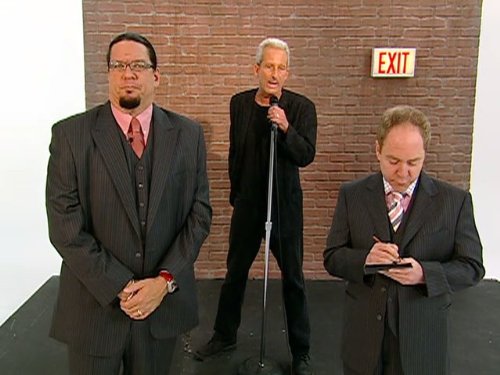
*I’ve found conflicting information about where to find this series in the United States, but as far as I know, it is currently legally available… somewhere.
From the very first episode, host Penn Jillette (along with his partner Teller) made it clear that there would be a lot of profanity on the show. This was apparently the only way they were legally allowed to host it. Apparently, if you say someone is scamming you or is lying to you, they’re allowed to take you to court and it’s on you to prove that you’re right, but if you say someone is bullshitting you, there’s nothing they can do to you. So rather than having to spend a lot of time in court, they just packed the show chock full of the kind of language that you couldn’t say in front of children, and thus they were largely litigation-proof.
If you’re familiar with Adam Ruins Everything and the YouTube channel Knowing Better, this is a similar concept. Penn and Teller tackle a topic and expose the bullshit surrounding it. Misconceptions are corrected, outright bullshit is exposed and Penn and Teller’s political stance is made known regarding the topics of a particular episode.
This is one of those shows that I am glad exists, even if I don’t agree with everything presented. In season one, they released an episode making fun of environmentalists, in season three, they came out against gun control laws – a very brave stance these days – and in season five, they defended Wal-Mart, but in season eight, they put out a pro-vaccination episode that offered proof that there’s no connection between the MMR vaccine and autism, and in season seven, they made an episode in support of video games. Not everything they present is something that everyone can get behind, and their method of “debate” leaves something to be desired, but if you like shows like Last Week Tonight, you may enjoy Bullshit! as well.
There are two episodes missing from digital distribution, though, and both involve religious topics. It’s really strange that Showcase went to great lengths to make sure that they would be allowed to broadcast such episodes, but then are chickening out when it comes to keeping such episodes available. The most notable of these is an episode that talks about The Vatican. I don’t think Showtime ever disclosed why they’re afraid of showing the episode again, and it was news to Penn Jillette when he found out that they were pretending the episode didn’t exist.
I find shows like this to be quite interesting, even if – as I said – I don’t always agree with what’s said. But speaking of shows that are quite interesting, one which began in the same year, is:
QI (2003)
Source: BritBox (Canada, United States)
Episodes: Ongoing, currently 279 + specials; limited legal streaming availability
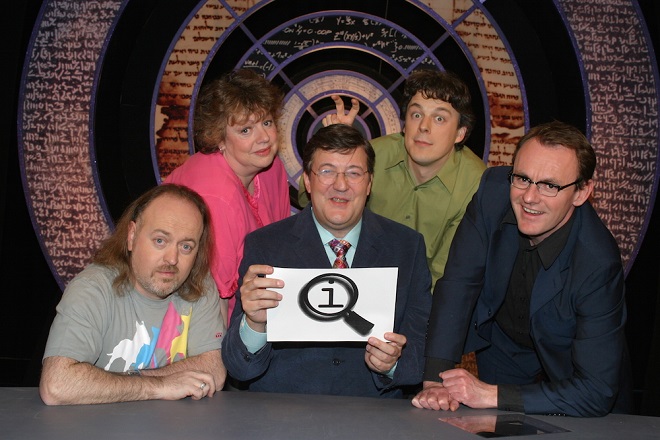
Hosted by Stephen Fry for the first thirteen seasons and Sandi Toksvig for hopefully the last thirteen seasons, QI is a British panel show that discusses various subjects which are “quite interesting”, hence the title. It’s also a comedy show in a similar vein to all of those old panel shows that used to air during the era of black and white television. Think shows like To Tell The Truth, Match Game and even the quiz show Hollywood Squares. A panel of celebrities discuss the topics being covered and answer questions posed by the host, scoring points in a similar manner as Whose Line Is It Anyway?: completely at the whim of the host. Giving an obvious but wrong answer loses ten points, but the host will give out points for interesting answers. In a show like this, it feels a lot more acceptable to have such a loose scoring system since no one’s playing for prizes and the points don’t matter at all, but in a show like Pop Quiz Hotshot, it feels like you can lose out on a material prize if the host likes your opponent better.
One slight problem you might have with QI is that sometimes it’ll ask a question and for all intents and purposes, the answer actually is the obvious one, but due to some technicality of definition, the actual answer is something else. How many moons does Earth have? One, but if you count several other near-Earth objects as “moons”, despite having orbits that make it impossible for most generations to even be able to see the object, the number can vary. In season one, the answer was presented as “two”.
One thing to pay attention to is that, starting with series F, extended versions of each episode also exist, so if you want to enjoy as much of the series as possible, you might want to seek out “QI XL” episodes starting with that series.
Oh, and before I forget…
Tiger content: Yep!
Occasionally, the show will cover topics of interest to big cat enthusiasts like me, which makes the series on topic for the Year of the Tiger. For example, where do most tigers live? The answer might surprise you. There is also an easy way to tell a lion and a tiger apart even if you shaved both of them until not a bit of fur is left. Please don’t do it, the lion will be sitting in a corner, crying over the loss of their impressive mane while the tiger rolls around laughing.
Anyway, if you’re looking to find out some interesting facts, can tell the difference between series and silly answers, and enjoy panel shows, QI just might be the show for you.
Come to think of it, if they wanted to, they could ask how many countries Canada shares a land border with, and if you were to give the obvious answer of one, you’re wrong, minus ten points for you. We share a land border with the United States and also with Denmark. Just a couple days ago, we ended our war with Denmark – a war which until now has lasted my entire life, and is known as the Whiskey War – and the disputed arctic island known as Hans is now split down the middle and shared between our two nations.
I promise that none of that was bullshit.
Even if COVID cases are going down yet again, one of the stories that’s been on perpetual repeat since 2020, it’s still worth watching out for the virus despite how tired that’s become. But it also couldn’t be clearer that it’s not easy for everyone to do this when even the United States’ director of the National Institute of Allergy and Infectious Diseases can get it despite telling everyone how to dodge it for over two years.





